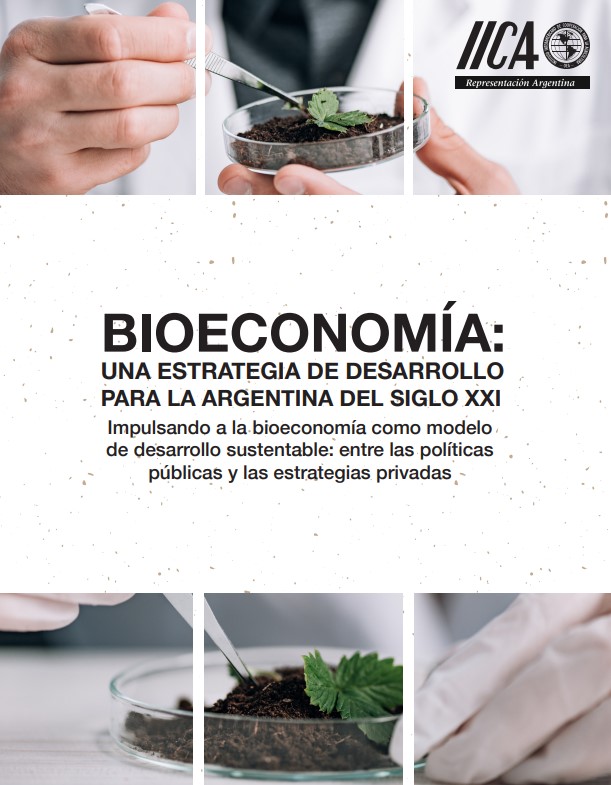Bioeconomy: an opportunity for Argentina’s sustainable development

San Jose, 15 December 2020 (IICA) - A great opportunity to overcome the dilemma between development and environmental protection, as well as to embark on a path towards economic growth while using natural resources in an efficient and sustainable manner.
That is how the book “Bioeconomy: A development strategy for Argentina in the 21st century” (available in Spanish only) describes an innovative proposal for fostering sustainable rural development in the country, which the Inter-American Institute for Cooperation on Agriculture (IICA) is promoting throughout the Latin American and Caribbean region.
The authors of the book are Jeremy Lachman, Roberto Bisang, Edith S. de Obschatko and Eduardo Trigo. The subtitle of the publication is “Promoting the bioeconomy as a sustainable development model in public policies and private strategies”.
The publication provides a detailed study of about ten successful business experiences related to the bioeconomy that have been developed in recent years in Argentina. These experiences pave the way towards a new production model that reduces the use of fossil fuels and, in turn, GHG emissions, that recycles and that capitalizes on waste to generate a variety of bioproducts.
The publication calls for growth with a strong commitment to the global challenge of combating climate change. This type of development would enable Argentina to overcome a period of economic stagnation that does not correspond to its natural resources or the quality education to which a large part of its population has had access.
What is the bioeconomy?
The bioeconomy is based on capturing free energy, transforming it into biomass and subsequently industrializing all products, by-products and waste in a comprehensive manner and with special care for the environment.
The bioeconomy could be defined as a model for the industrialization of biology, which allows for diversifying export patterns for primary products and agro-industrial commodities, through the incorporation of high value-added exports and proven sustainability.
The broad definition of the bioeconomy includes all products that utilize biomass and biotechnology as inputs.
Based on the use of renewable energy and the development of natural materials, the bioeconomy has been successfully implemented in developed countries. In Argentina, the combination of natural resources and biological knowledge available offers great potential for the bioeconomy to leverage development in the upcoming decades.
Transformation is already underway
The bioeconomy is currently playing a relevant role in Argentina, where it has been incorporated into the business sector, through the inclusion of new activities in traditional agricultural production activities.
The most noteworthy progress has been achieved in the field of biofuels, which are already making a valuable contribution to the development of an electrical matrix that is less dependent on fossil fuels.
However, there have been positive experiences in other areas as well. In this regard, the book describes the success stories of agricultural producers, biotechnology-based agro-industrial companies and new business undertakings that are entirely based on the bioeconomy in Argentina.
The book presents several cases related to biotechnology, a highly developed sector with great potential in the country, and in which significant progress has been achieved at the international level.
Other examples cover a wide range of activities, including the transformation of waste from industrial processes into by-products with economic value, the use of sugarcane bagasse or peanut shells to generate electricity, or the conversion of fatty and non-fatty wastewater from poultry farming into biogas.
According to available estimates, the bioeconomy generated 86.69 billion dollars in 2017, which represents 16.1% of Argentina’s GDP. Of this total, 85% corresponds to the production of added value from biomass and the industrialization of bio-products, while 15% corresponds to trade and transport services.
The growth of the bioeconomy, which, thus far, has been spearheaded by entrepreneurs, depends on the State’s involvement to become consolidated. To this end, the State must take on an active role in developing public policies that facilitate the transformation of current “niches” into new standards for investment and consumption decision-making within the economy.
At the global level, and in an accelerated manner, the bioeconomy is consolidating its standing as an alternative to overcome two of the greatest challenges at present: meeting the growing demand for food, fiber and energy of a global population that will surpass ten billion people before the end of the 21st century, and reversing or mitigating the negative impacts of current economic organization patters on the environment and natural resources.
More information:
Institutional Communication Division
comunicacion.institucional@iica.int